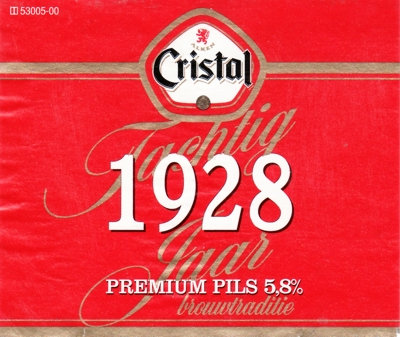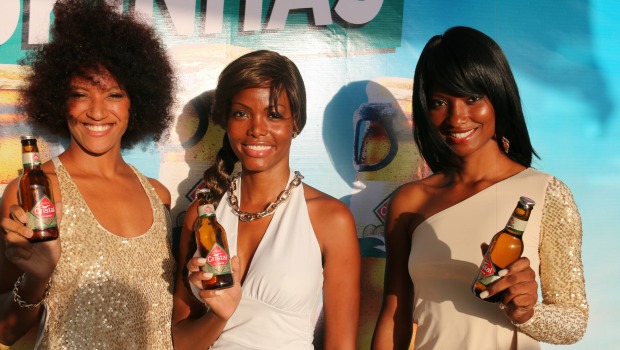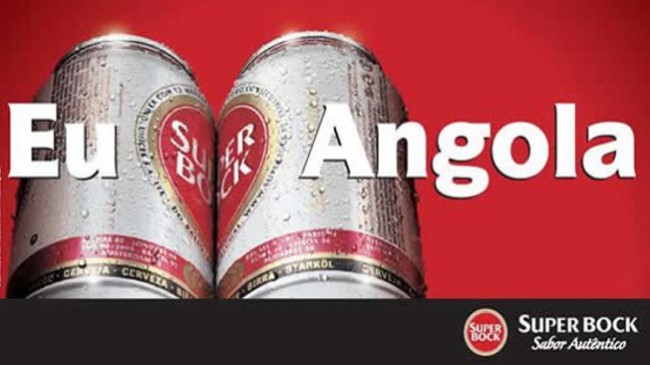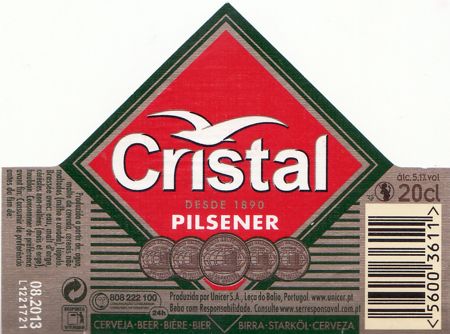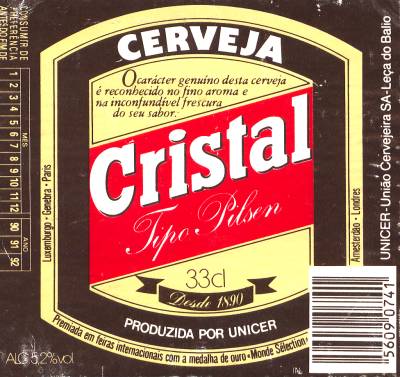Spot de televisão para a promoção Cristal pack 24, para oferta de smartphones e cartões de chamadas
https://youtu.be/DRtpk0pUvWY
(www.executive-angola.com/en/portfolio_post/promocao-pack-24/)
Spot de televisão para as novas minis "Freskinhas" da cristal, bem a tempo do calor (www.executive-angola.com/portfolio_post/cristal-freskinhas-apresentam-nova-cristal-mini/).
Momentos Brilhantes com Paulo Flores No quintal com Paulo Flores Spot TV da marca Cristal.
(www.executive-angola.com/en/portfolio_post/momentos-brilhantes/)
Cristal Angola of België?
Cristal Alken is een pilsener bier dat in mei 1928 als eerste pils in België werd gecreëerd door Jozef Indekeu en Edouard Boes te Alken. Het bier wordt vandaag in de Limburgse Brouwerij van Alken gebrouwen. Op het moment van de stichting van Cristal waren vele Belgische brouwers nog niet in staat om bier van lage gisting te produceren, waardoor het product als revolutionair onthaald werd. Jozef Indekeu en zijn brouwersfamilie lagen hiermee aan de basis van de Belgische pilsproductie. Het merk groeide uit tot de bekendste pils van Limburg maar wordt ook ver daarbuiten gedistribueerd. In 1989 kreeg de brouwerij in Londen de Gouden Medaille (Monde Sélection) voor kwaliteit.
Ter gelegenheid van het 80-jarig bestaan werd in 2008 Cristal 1928 gelanceerd (5,8%), gebrouwen volgens de stijl van de originele pilsener van het begin van de 20ste eeuw (https://nl.wikipedia.org/wiki/Cristal_Alken).
Mals water recht uit de Haspengouwse natuur. Pure ingrediënten. Ambachtelijke kennis en ... hop: je krijgt een pittige pils met een verfrissend bittere afdronk. Cristal, gebrouwen in het hart van Limburg en dus nooit langer dan 45km onderweg. Dat proef je (http://www.cristal.be/pils.php).
Alken-Maes viert 80ste verjaardag Belgische pils met "Cristal 1928"
Om het tachtigjarige bestaan van het eerste Belgische pilsbier Cristal te vieren, brengt brouwerij Alken-Maes een nieuwe premium pils op de markt, "Cristal 1928".... In mei 1928 werd in de brouwerij van Alken biergeschiedenis geschreven. Toen lanceerden de oprichters van de brouwerij, Jozef Indekeu en Edward Boes, de Cristal. Dat was het eerste bier in België dat volgens de traditie van de Tjechische pilsnerbieren werd gebrouwen (www.hln.be/hln/nl/942/Economie/article/detail/243134/2008/04/15/Alken-Maes-viert-80ste-verjaardag-Belgische-pils-met-Cristal-1928.dhtml).
Unicer Bebidas de Portugal, SGPS, SA is a Portuguese company with the decision center in Portugal.[4] Its activity is set up on the business of Beers and bottled Water.[3] It is the largest Portuguese beverage company[5] and is also present in the areas of soft drinks, ciders and wines, in the production and sale of malt, and in the Tourism business.
Unicer is a company with majority of Portuguese capital and decision center in Portugal, owned in 56% by Viacer (BPI, Arsopi and Violas) and 44% by the Carlsberg Group. The Holding Viacer congregates three Portuguese groups - Violas (46.5%); Arsopi (28.5%) and BPI (25%).[6]
Unicer is the largest Portuguese exporter of beer - an operation that has already reached more than 50 countries, mainly through Super Bock, which is the best-selling Portuguese beer in the world.[7]
The company follows a multi-brand and multi-business strategy, focused on Beer and bottled Water but extends to the segments of Soft drinks, Cider and Wine. Unicer is also associated with the activity of malt production and sale and holds assets in the Tourism sector, Vidago and Pedras Salgadas Thermal Parks, both in Trás-os-Montes region (North of Portugal).[8]
The origin of the company date back to the beginnings of the beverage sector industrialization, during the second half of the nineteenth century, when, on March 7, 1890, CUFP (Companhia União Fabril Portuense das Fábricas de Cerveja e Bebidas Refrigerantes) was formed. This conglomerate can be considered the mother of the current beverage company,[9].... In the Portuguese revolutionary period (that came after the Carnations Revolution), CUFP was nationalized on August 30, 1975.[11] In December 1977, the State restructured the sector, combining the five nationalized companies into two, Centralcer, and Unicer - União Cervejeira (gathering CUFP, Imperial and Copeja).[12]
In 1988, by the Decree-Law No. 353/88, Unicer was transformed into "Public Limited Liability Company with a majority public capital" with the designation Unicer - União Cervejeira, SA.[13]
... Unicer’s economic and financial indicators during the eighties justified that it had been chosen by the government to begin the process of privatizations.[10] Thus, on April 26, 1989, in a public session held in the Oporto Stock Exchange, the privatization of 49% of capital took place.[15] In 1990, the year the company celebrated its centenary, the privatization was completed, with the sale of the 51% stake that was still held by the State..... In 2000, the core of Unicer shareholders, along with Viacer holding company, launches a public takeover bid, and gets to hold the totality of the capital, except for the shares of the company in itself.[10][20]
By the end of 2000, it was formalized the change of name from Unicer - União Cervejeira, SA, to Unicer - Bebidas de Portugal, SA.[21] A year later, the company changed its legal status, becoming a holding company and rearranging and empowering the various business units.[22] ... Unicer celebrated its 125th birthday on March 7, 2015, in a ceremony presided over by President of the Republic, Aníbal Cavaco Silva.[29] The celebration coincided with the inauguration of the new industrial complex at Leça do Balio, part of the new warehouse, the headquarters building and the Beer Production Centre, in an investment of €100 million.[30]
The Beer Production Centre stands out by combining new equipment, technologically superior, and a greater production capacity.[31] ... Currently, Unicer has commercial activity in more than 50 countries spread over five major markets: Angola, Rest of Africa, Europe, America, Pacific and Middle East.[26]
Since the 2000s, Unicer has expanded substantially its exports. ... The Angolan and European markets are the main contributors to the growth of Unicer, which holds a prominent position in the Portuguese beer exported leadership.[39]
The main export market remains Angola,[40] where Super Bock is at the top of the preferences among beer brands imported.[41][42] (https://en.wikipedia.org/wiki/Unicer_Brewery)
Op ratebeer zijn 6 brouwerijen bekend, waarbij Unicer dan weer ontbreekt...
Brewers competing for a share of Angola’s beer market
Angola has the third largest domestic market for alcoholic beverages in sub-Saharan Africa after South Africa and Nigeria, yet despite this it still has significant growth potential.
Nigeria, which is second only to South Africa, has immense potential, however, installed capacity is currently meeting demand.
Angola’s market is undersupplied, and the monopolistic brewer, Cuca, has grown exponentially in the six years since privatisation. With stabilisation, Angola is looking to open up its beverages market and the entry of heavy weights, SABMiller (South Africa) and Unicer (Portugal), is set to boost domestic supply as there is still a massive deficit, currently being met by imports.
Angola’s higher than average per capita consumption at over 29 litres per person per annum is testimony of the booming real economy, driven by seven years of strong double digit growth.
...
Cuca is Angola’s largest beer and beverages manufacturer, boasting a 90% share of the local beer market, distributed country wide under the brands Cuca, Nokal and Eka. The company is owned by the French beverages giant Group BGI (Castel), who has a partnership with the MPLA’s financial investment company, GEFI.
...
Unicer is the market leader in Portugal with a market share of 51.3% in 2008. In Africa, Unicer’s strategy is to consolidate its position in Lusophone countries (Angola, Cape Verde, Mozambique, and Guinea Bissau), where it has a marked legacy/language advantage.
On 29 January 2009 Unicer announced plans that it would commence the construction of a 2m hl brewery in Angola with an initial €120m investment. The group’s application to open up a factory was initially presented in 2005, however, the pre‐requisite of a local partner had not been met. Three Angolan partners have since been shortlisted for this project and the brewery should commence production in 2011 and is expected to reach full production by 2013/2014.
Unicer is the largest Portuguese beverages exporter to Angola, representing 70% of the total beer imports into Angola. In 2008, Unicer imports into Angola reached a figure of 1.33m hl (about 1,200‐1,500 containers per month), of which 1.08m hl was beer in the guise of Super Bock, Cristal and Carlsberg and the balance, 25m litres, was fizzy and still water under the Caramulo brand (www.howwemadeitinafrica.com/brewers-competing-for-a-share-of-angolas-beer-market/).
UNICER: Brewingcorruption in Angola
The multinationals in the drinks sector have developed a keen interest in the Angolanmarket,whichisthethirdbiggestbeerconsumerinAfrica. Foreign investors seekingawayintoAngolanmarketsneedtofollowtwofundamentalrules.Thefirst involves setting up business partnerships with powerful figures in the regime; the second involves ignoring the relevant legislation, relying on the impunity of governmentleaders (www.makaangola.org/wp-content/uploads/2012/04/UnicerBrewingCorruption.pdf).
To tell the story of Unicer, we have to go back to 7 March 1890, the date on which Companhia União Fabril Portuense das Fábricas de Cerveja e Bebidas Refrigerantes - Sociedade Anónima de Responsabilidade Limitada, popularly known as CUFP, was created from the merger of seven breweries (www.unicer.pt/en/).
Cristal is the oldest beer on the Portuguese market - since 1890. It is a quality beer, light in colour and with a large, persistent, white head. The yeast used in its manufacture makes it particularly light, slightly lighter than typical beers in the Portuguese market, with a unique aroma and flavour. In recent years, it has received numerous awards from Monde Selection, including several gold medals. Cristal is the light beer that refreshes! (www.unicer.pt/en/home-en/brands/beer/cristal-en#94)
CRISTAL PRETA
"On the market for more than 100 years"
Cristal Preta was inspired by Dunkel Lager beer from Munich. The water in this German city has very special characteristics (very hard) leading to the use of a dark malt to balance the recipe. Its moderate alcohol content, malt notes, dark colour, dry and toasted flavour are typical of this type of beer. A tribute to Munich designed by Unicer’s first master brewers! INGREDIENTS:
Water, Barley malt, Non-malted cereals (corn and barley), Sugar, Hops (www.unicer.pt/en/home-en/brands/beer/cristal-en#94).
CRISTAL BRANCA
"On the market for more than 100 years"
This is a quality beer, with the characteristics of a Pilsener: light gold colour, large, persistent and white head.
It has a special lightness, slightly lighter than typical beers in the Portuguese market, with a slightly fruity aroma and malt notes. Cristal is the light beer that refreshes!
Cerveja Cristal é a leveza que refresca!
INGREDIENTS: Water, Barley malt, Non-malted cereals (corn and barley), Hops.
Dus zowel de Belgische als de Angolese (eigenlijk Portugese) Cristal zijn pils:
Pils (ook pilsener of pilsner genoemd) is een soort bier dat voor het eerst door de Duitser Josef Groll in de stad Pilsen (Tsjechisch: Plzeň) in het voormalige Oostenrijk-Hongarije en het huidige Tsjechië werd gebrouwen. De naam is afgeleid van de naam van de stad. Pils bevat ongeveer 5% alcohol. Het is een ondergistend bier met een goudgele kleur. Pils komt het beste tot zijn recht bij een temperatuur van 4 graden Celsius.... Toen in de negentiende eeuw in Pilsen de koeltechnologie werd ontwikkeld, en dus ondergistende bieren veel gecontroleerder gebrouwen konden worden, werd het eenvoudig om bier van constante kwaliteit te brouwen. Daarnaast kon de mout veel beheerster worden gedroogd, waardoor deze licht van kleur bleef. Vandaar de licht- tot goudgele kleur van pils. Door het goed controleerbare brouwproces ontstond een bier met geringe smaakafwijkingen, dat gemakkelijk wegdronk. Een belangrijke factor in het succes van pils was de industrialisering van de glasproductie, waardoor drinkglazen voor een groter publiek betaalbaar werden. De heldere pils werd door veel mensen aantrekkelijker gevonden dan de troebele bieren die men kort daarvoor nog uit ondoorzichtige bekers dronk. De populariteit van pils nam enorm toe; bovengistende bieren werden beetje bij beetje van de markt verdrongen.
Het eerste succesvolle pils werd in 1842 gebrouwen en bestaat nog steeds: Pilsner Urquell. De pilsbrouwerijen waren echter afhankelijk van grotten en groeven voor de koeling, zodat het pils niet overal kon worden gebrouwen. In de jaren 70 van de 19e eeuw kwamen koelmachines ter beschikking, zodat het pils ook elders kon worden gebrouwen. De aanwezigheid van koelinstallaties maakte dat een brouwerij sindsdien ook wel als ijsfabriek fungeerde (https://nl.wikipedia.org/wiki/Pils).
Pilsner Urquell is a lager brewed in Plzeň (Pilsen), Czech Republic and is the world's first pilsner beer, brewed since 1842. The beer is a bottom-fermented lager beer with a 4.4% alcohol content (ABV) and brewed by global brewer SABMiller (http://jorisroovers.github.io/worldofbeers/).
Dus nadat in 1842 pils was 'ontdekt' kwam in 1890 in Portugal de Cristalpils en pas 38 jaar later in 1928 de eerste pils in België!? België een echt bierland? Was de Portugese Cristal wellicht ook de eerste Portugese pils? Alhoewel... wellicht verwijst die 1890 naar het begin van de brouwerij en niet naar het jaar dat de Portugese Cristal pils op de markt kwam!?
The word for beer in Portuguese is cerveja, coming from the Latin word cerevisia. Modern Portuguese breweries were started in Portugal in the 19th century. Portugal's Estado Novo regime, headed by António Salazar, protected national industry from foreign control, including the beer sector, during his time in power. Brewing in Portugal was long dominated by two companies — Unicer - Bebidas de Portugal, S.A. and Sociedade Central de Cervejas, S.A. They were created from the remains of well-established Portuguese brewers after the 1974 military coup, when the industry was nationalised. Both were privatised in the 1990s. Between them, they control more than 90% of the Portuguese beer market (https://en.wikipedia.org/wiki/Beer_in_Portugal).
(www.beersofeurope.co.uk/portuguese-beer) (www.portugalvisitor.com/portugal-culture/portuguese-beer)
Portugal is not a country particularly noted for its beer.... Brewing in Portugal was long dominated by two companies - Unicer and and Centralcer. They were created after the 1974 revolution when the brewing industry was nationlised. Both were privatised in the 1990's. Between them they control more than 90% of the Portuguese beer market. ... Portugal has no indigenous beer styles. Everything is bottom-fermented, except for German-style wheat beers. The overwhelming majority of beer sold is pale lager.
None of the beers - even ones in styles like pilsener where you might expect it - are very hoppy. Some Preta/Stouts demonstrate a firm roastiness.
Strengths vary between 4.3%, for Preta, to 6.6% for one of the fancilly-labelled amber lagers (www.europeanbeerguide.net/portbrew.htm).
The origins of Unicer date from the movement by industrial brewers in Porto to found, on 7 March 1890, CUFP - Companhia União Fabril Portuense das Fábricas de Cerveja e Bebidas Refrigerantes, a private limited liability company, with initial capital of 125 contos. Their aim was to combine their financial and technical capacity in order to develop their sector of industry. Of the seven companies that joined together in this project, six in Porto and one in Ponte da Barca, some already had several decades of experience. These were the breweries that had begun to supply Portuguese beer to cafés and cervejarias in Porto, gradually replacing imported beer, at a time of changes in consumer habits, particularly in urban areas. In a country with a tradition of wine, beer went from being a “strange drink” to being a “fashionable drink”.
1900
A call was made for new master brewers. A German specialist was hired, with amonthly salary of 350 marks (at the exchange rate of the last day of the month)plus one real for each litre of beer sold (above 300,000) .... 1916
By government order, the two master brewers were deported in 1916. However,one of them settled in Vigo, from where he provided all the instructions necessaryto make beer....
1926
Beers from Lisbon started to enter the market in the north of Portugal to competewith Christal. (www.unicer.pt/en/home-en/2014-02-17-10-48-12/history) (www.unicer.pt/en/home-en/2014-02-17-10-48-12/history).
1926 is nog steeds eerder dan 1928. De Portugese pils was dus eerder dat de Belgische pils. En dat terwijl Portugal geen bierland is en België wel!?
A call was made for new master brewers. A German specialist was hired, with amonthly salary of 350 marks (at the exchange rate of the last day of the month)plus one real for each litre of beer sold (above 300,000) .... 1916
By government order, the two master brewers were deported in 1916. However,one of them settled in Vigo, from where he provided all the instructions necessaryto make beer....
1926
Beers from Lisbon started to enter the market in the north of Portugal to competewith Christal. (www.unicer.pt/en/home-en/2014-02-17-10-48-12/history) (www.unicer.pt/en/home-en/2014-02-17-10-48-12/history).
1926 is nog steeds eerder dan 1928. De Portugese pils was dus eerder dat de Belgische pils. En dat terwijl Portugal geen bierland is en België wel!?




